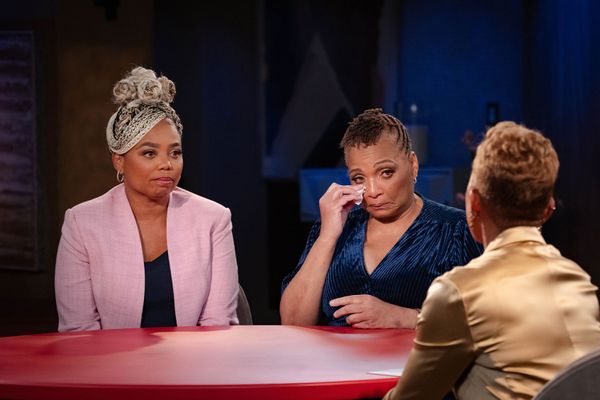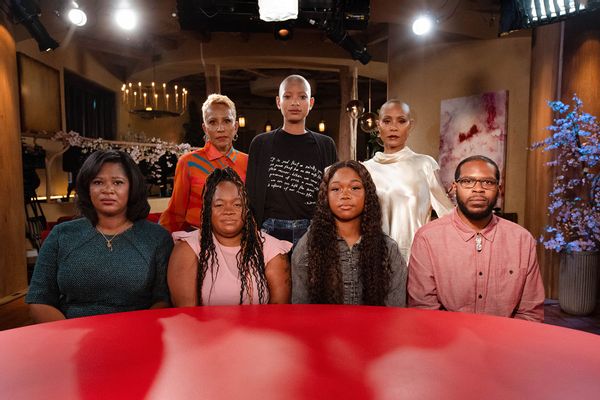Why “Red Table Talk” is the closest inheritor to Oprah’s mantle as TV’s great celebrity confessional
The last time award-winning journalist Jemele Hill visited “Red Table Talk” – the Facebook Watch magnet hosted by Jada Pinkett Smith, her mother Adrienne Banfield-Norris, and daughter Willow – was in October 2020. In that third season episode, Hill and her friend and former ESPN colleague Cari Champion examined why women, particularly Black women, can be so mean to each other.
When the discussion came around to betrayals, Hill admitted that the woman who betrayed her the most deeply is her mother, Denise, whose substance abuse led to her frequently letting her daughter down. So it makes sense that when Hill returned to the Smith family’s table this week – two years after that initial revelation, almost to the day, Denise would be seated beside her for their first-ever broadcast interview together.
Hill’s new memoir “Uphill” came out this week, but that matters less to Pinkett Smith, Will, and Gammy (as “Red Table” viewers know Banfield-Norris) than Hill’s representative power as a living story. Being let down by their mothers is a deeply rooted feeling that Pinkett Smith and Hill have in common. The more important part is the fact that both daughters found it in themselves to forgive their mothers and move forward.
Mothers are imperfect and fallible, as Pinkett Smith and Gammy are constantly reminding their guests and viewers, many of whom are among the 11 million followers of the show’s Facebook page. That factor also enables people to open up to the hosts, as Denise does when she candidly talks about the sexual assaults she endured when she was younger and the fact that she lives with PTSD.
If you weren’t aware of “Red Table Talk” before March of this year, there’s a strong chance you heard about it in the wake of Will Smith’s slapping Chris Rock onstage at the Oscars. The Smith family went silent afterward, leaving it to the paterfamilias’ PR team to do damage control via press release. He’s since resigned from the Academy of Motion Picture Arts and Sciences and was banned from attending the Oscars for the next decade.
Enough about him. The carefully managed statements from his professional squad mattered less than what the Smiths would ultimately come to say around the infamous table where, among other revelations, the couple set the record straight regarding the state of their marriage and Pinkett Smith confirmed that while they were separated, she engaged in an “entanglement,” as she meme-ably put it, with hip-hop star August Alsina.
It was expected, then, that the fifth season premiere in April would be devoted to addressing how that event impacted “Hollywood’s First Family of Putting It Out There,” as New York Times’ Jon Caramanica describes the Smiths. But that would not fit the brand.
 Jemele Hill and her mother Denise on “Red Table Talk” (Red Table Talk/Facebook Watch/Jordan Fisher)
Jemele Hill and her mother Denise on “Red Table Talk” (Red Table Talk/Facebook Watch/Jordan Fisher)
To the casual “Red Table Talk” cruiser, whose exposure to the show mainly comes via outtakes written up on various sites, it certainly would seem to. But this forgets what makes this fine Smith media product different from other celebrity-hosted daytime talk shows as we know them.
For five seasons, healing and journeys have been the main thrust of this show, albeit presented under different headlines.
“Red Table Talk” has less in common with “The (Insert Celebrity Name Here) Show” than some combination of an empathetic, fly-on-the-wall unscripted series like “Intervention” and a Kardashian vehicle. It takes the gritty realistic conversations and situations of the former type of show and filters them into a safe space with good lighting and a top-shelf makeup artist, and through famous people who have, you know, done “the work.”
Therefore, when the season opened with a title card reading, “Considering all that has happened in the last few weeks, the Smith family has been focusing on deep healing. Some of the discoveries around our healing will be shared when the time calls,” there was little reason to doubt that statement’s authenticity. For five seasons, healing and journeys have been the main thrust of this show, albeit presented under different headlines.
In the many years that have passed since Oprah Winfrey abandoned her daytime post the question of which celebrity would succeed her as High Confessor to the Stars. Nobody has proven up to the task save for Winfrey herself – and even now, she mainly flexes her power not to seek forgiveness for famous wrongdoers but to provide a select, royal few a platform to “set the record straight,” as it were.
People once joked about her role as Hollywood’s sin launderer but the fact that hosts like Ellen DeGeneres failed to fill that role proves how difficult that is.
“Red Table Talk” comes close, although is decidedly not a platform for celebrity apologia or a waystation on one’s quest for absolution. The artist formerly known as Kanye West will not find much welcome here, although the people who survived him might if their story is appealing enough. Rather, it is a place where stars bare their souls to persuade and remind us of their vulnerability, and more than this, their relatability.
This begins with the hosts themselves. As careful as the Smiths are to give their guests the spotlight – that is, in the weeks that aren’t tangentially about their lives – scenes are edited to feature Pinkett Smith’s, Gammy’s and Willow’s and their guests’ reactions as they process what’s being said.
The emotionally expressive responses to the spontaneous pearls of wisdom that spill around the table, whether from famous people or the experts brought in to offer insight and counsel, are as vital to the conversation as what’s being said.
“I think, you know, our stories aren’t unique,” Pinkett Smith observes in this week’s episode. “Sharing our journeys helps people understand how to navigate their own journeys.”
And if emotional journeys and tearful conversations we witness come off as unscripted and natural because, especially in cases like Hill’s mother Denise, they are. This is also why the “Red Table Talk” guest list is light on congressional officials or political candidates, unlike “The Oprah Winfrey Show.” That was a place where politicians could masquerade as regular folks and the host would play along.
That doesn’t fly with “Red Table Talk,” although it works well when the family uses its platform to elevate discussions that need to be had concerning social justice and inequality. Politicians need showmanship to survive, which is why so many agree to endure “The View” during campaign season.
 Lonita Baker, Tamika Palmer, Ju’Niyah Palmer and Kenneth Walker on “Red Table Talk” (Red Table Talk/Facebook Watch/Jordan Fisher)
Lonita Baker, Tamika Palmer, Ju’Niyah Palmer and Kenneth Walker on “Red Table Talk” (Red Table Talk/Facebook Watch/Jordan Fisher)
People working for the causes of civil rights win by making their case a personal intimate concern to people who would hear them. The “Red Table Talk” episode featuring Breonna Taylor’s mother Tamika Palmer, her sister Ju’Niyah Palmer and her boyfriend Kenneth Walker, is the most moving fifth season episode so far for that reason.
The Smiths take viewers step by step through the New York Times’ examination of Taylor’s fatal shooting on March 13, 2020, as she and Walker were sleeping, and the subsequent Louisville police cover-up without softening any terms around the cops’ culpability.
Jada, Willow and Gammy excel at creating a safe therapeutic space for household names to let their guard down.
“Red Table Talk” also brought in activist Tamika Mallory and CNN analyst Laura Coates, along with other legal experts, to further validate their assertions that justice still has not been served. (Among the facts of which we’re reminded is that Walker, one of the victims in this case, is the only person involved to have served jail time. A judge has since permanently closed the case against him.)
The beauty of having a show with no ads or corporate sponsors is that Taylor’s loved ones were able to speak freely about the psychological toll they’ve borne without the producers fearing any partisan backlash. So far the episode has garnered 6.4 million views.
Want a daily wrap-up of all the news and commentary Salon has to offer? Subscribe to our morning newsletter, Crash Course.
In the longer term, this expertly packaged authenticity also serves the Smiths and their careers. In a profile for The Cut, Pinkett Smith said that “Red Table Talk” was a way for her to revitalize her career after she turned 40, that age when actresses, along with most women, suddenly become invisible. In other words, it’s an intentionally charted journey upon which she’s brought her daughter and mother, and occasionally her son Jaden and her husband.
But the fact is that she, Willow and Gammy excel at creating a safe therapeutic space for household names to let their guard down. This also means that when and if that time ever “calls” for the family to bare their souls about the Oscars incident beyond Pinkett Smith’s stated hope that “these two intelligent, capable men have an opportunity to heal, talk this out and reconcile,” whatever they say will likely be taken by many at face value.
That is the benefit of sculpting a show where the brand is one’s truth and honesty – a power wielded sparingly and to impressive effect, and one they trust their audience to believe because they work to make it believable.
“Red Table Talk” episodes stream on Facebook.
Read more
about talk shows

